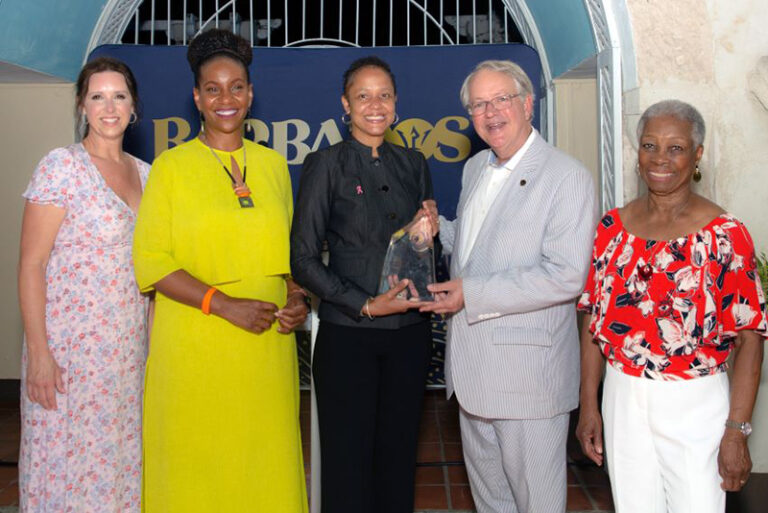Vindos de Barbados, imigrantes ajudaram na construção da Estrada de Ferro Madeira-Mamoré e consequentemente na criação do estado. Ilha se tornou oficialmente república esta semana, após quase quatro séculos sob o comando da coroa britânica.
/i.s3.glbimg.com/v1/AUTH_59edd422c0c84a879bd37670ae4f538a/internal_photos/bs/2021/H/w/YbA657S3aYVfC0P9wboQ/g1-favicon.png)
g1.globo.com
Coming from Barbados, immigrants helped in the construction of the Madeira-Mamoré Railroad and consequently in the formation of the state. The Island officially became a republic this week, after nearly four centuries under the rule of the British crown.
In the week that Barbados officially became a republic, after nearly four centuries under the rule of the British crown, the descendants of immigrants from that country who live in Rondônia see the change as an opportunity for cultural development and economic growth.
Over a hundred years ago, hundreds of Barbadians immigrated to Rondônia. Their work, sweat and blood helped build the Madeira-Mamoré Railroad (EFMM) and, consequently, the history of the state of Rondônia.
Professor and Doctor of Education Cledenice Blackman is a descendant of some of these Barbadians. Her great-grandparents, Preston Blackman and Constancia Goodrich, arrived in Porto Velho around 1910. Decades later, the professor focuses her academic career on highlighting the trajectory and social relevance of her ancestors in Rondônia.
Historian Cledenice Blackman — Photo: Social Media
For her, Barbados' transition from monarchy to republic opens up possibilities for implementing a policy focused on the real needs of the Barbadian people, no longer linked to English culture.
"The date reflects an attempt at historical reparation linked to the slavery of my ancestors and my ancestors who suffered violently from the slavery process that took place on the island of Barbados that was colonized by England", she says.
Teacher Sheila Roque, 44, is also of Barbadian descent. Her grandfather and family patriarch, David Rock, had to leave the island, then ruled by the British crown, in search of a better quality of life. In Rondônia he created bonds and formed a family.
Descendants Sheila Roque and her mother, Xiquita Rock — Photo: Social Media
"From 1700 until this independence process, how many Barbadians fled the country in search of a better living? My grandfather came to Rondônia because here he got a job and there he was starving," she recalled.
David died at the age of 76, before his granddaughter was born. Even without having met her, she has an idea of her grandfather built by the legacy and memories that echo through family and friends with whom he lived in Porto Velho.
David Rock, a Barbadian who lived in Rondônia. — Photo: Sheila Roque/Personal Archive
Miss Rondônia 2016, Mariana Theol, was the first black Miss elected in the state and is also of Barbadian descent. At the time she was crowned, Mariana spoke about her pride in her Barbadian heritage and the honor of representing her community as the first black woman to compete nationally for the state.
"I felt I was honoring the memory of my Barbadian ancestors who were responsible for populating my state. I cannot measure the happiness I had in being the first black Miss Rondônia", said Mariana.
Mariana Theol was crowned Miss Rondônia in 2016 — Photo: Pamella Urie/Elefantizar
The dream of going to Barbados
Teacher Sheila currently has no contact or knowledge of relatives living in Barbados, but she is part of a group with dozens of other Barbadian descendants spread across Brazil, including historian Cledenice Blackman.
With that in mind, the Barbados embassy in Brazil planned a trip with several descendants that would take place between 2020 and 2021. However, because of the pandemic, the trip did not happen and remains a dream.
The idea was to take a trip to learn about the origins of the Barbadians who live in Rondônia, meet distant relatives, do some sightseeing and get to know the history of the island. (...)
Afro-Antilleans in Porto Velho
Construction site of the Madeira Mamoré Railroad, in 1910, when workers were assembling a locomotive — Photo: Luiz Brito
In an article titled "Afro-Antilleans in Porto Velho, Brazil: History, Culture and Literacy", published in the
Humanidades e Inovação academic journal in 2020, Dr. Cledenice and two other researchers analyze the historical context of Afro-Antilleans in the region, among them those who came from Barbados.
The research points out that there is a generalization in the historical documents about the Barbadians in Rondônia. Since the term "Barbadian" is used to refer to all immigrants from the Caribbean islands and the English Antilles.
"When the construction of the railroad came to an end in 1912, many foreigners managed to return to their countries of origin, leaving a significant number of Afro-Antilleans located in Barbadian Town, a neighborhood of Porto Velho", the article says.
According to Cledenice, Porto Velho is the city that has the largest contingent of descendants of Afro-Antilleans.
Barbadian Town in Porto Velho. — Photo: Dana Bernad Merrill/ Colorized by: Luis Claro
The railroad was part of the Petrópolis treaty signed with Bolivia, with the aim of facilitating the transport of rubber to the Atlantic Ocean. After being inaugurated, it operated for two years and was deactivated. (...)
The culture there is so scarce even the wiki pages are out here struggling









:strip_icc()/i.s3.glbimg.com/v1/AUTH_59edd422c0c84a879bd37670ae4f538a/internal_photos/bs/2021/l/D/1DcBECR8SXEUVrbOSB5g/240402989-4245666205512070-4598927659314515627-n.jpg)
/i.s3.glbimg.com/v1/AUTH_59edd422c0c84a879bd37670ae4f538a/internal_photos/bs/2021/M/H/v95FN6RPSvVB7J4StYYw/sheila-e-mae.jpg)
/i.s3.glbimg.com/v1/AUTH_59edd422c0c84a879bd37670ae4f538a/internal_photos/bs/2021/e/x/xZcB3xRAK0AroY6jnSnA/anyconv.com-bff996d6-9112-43dd-b85c-6f8e66535ef6.jpg)
/i.s3.glbimg.com/v1/AUTH_59edd422c0c84a879bd37670ae4f538a/internal_photos/bs/2021/K/8/R4yc0oQRGEuKj9He2VuA/whatsapp-image-2021-12-03-at-18.01.19.jpeg)
/s.glbimg.com/jo/g1/f/original/2014/10/01/img_3376.jpg)
/i.s3.glbimg.com/v1/AUTH_59edd422c0c84a879bd37670ae4f538a/internal_photos/bs/2021/W/F/Ar895TRMa7FfQWBUzQHg/fonte-merrill-dana.-barbadian-town-em-porto-velho..jpg)



